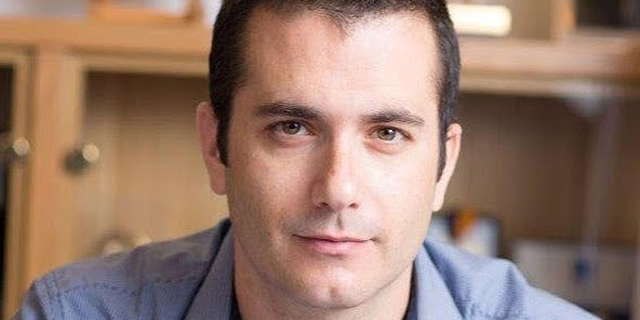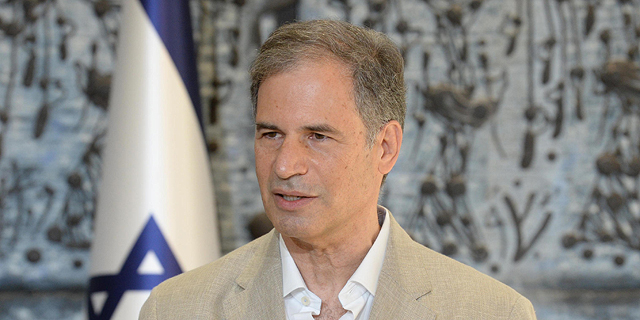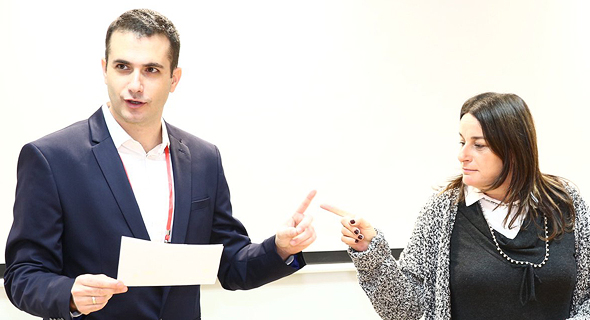
Interview
“Eytan Stibbe is leading the next wave of private astronauts,” says head of Ramon Foundation
The former fighter pilot turned businessman is breaking new ground for private space exploration, demonstrating the pioneering Israeli spirit
Stibbe only has around a year to prepare for the flight, and over the next several months will begin some of those preparations, noted Livne. During the coming months, he will embark on a mission on Earth, in Israel to be specific, heading an educational outreach program to Israeli schoolchildren, while promoting space education, and spreading the word about homegrown Israeli and international space technologies. As for the final four months before his flight, he will undergo intense training in NASA’s Johnson Space Center in Houston, Texas, where he will learn about the International Space Station (ISS), and the spacecraft that Axiom Space is sending him on, a SpaceX Dragon Capsule. Stibbe is leading the way for private astronauts, and will be the first sent by a nonprofit organization. “He’s different from his colleagues, as most are coming on their own and don’t have the resources, partnerships and tools of the Ramon Foundation or experience with science,” Livne noted. "Today, we and the Israeli Ministry of Science and Technology are working out ways this mission would benefit Israeli society."
In an interview with CTech, Livne said that he isn’t worried about the fact that Stibbe will be the oldest astronaut to board the station (he will be 63 at the time) or that he’ll be the second-oldest astronaut in space. As part of routine requirements, Stibbe had to pass grueling tests of physical health and stamina. To put it simply, as a former fighter jet, with thousands of clocked flight hours piloting an F-16, Livne doesn’t believe anyone should be worried.
When asked whether Stibbe’s flight will perhaps pave the way for a future Israeli female astronaut, Livne said “I’m quite optimistic that we will next send an Israeli woman to space.”
Continuing Ilan Ramon’s legacy
Livne is the General-Director of the Ramon Foundation, a nonprofit founded by fallen first Israeli astronaut Ilan Ramon’s wife, Rona, and dedicated to promoting leadership programs, expanding space and STEM education for youth, and improving and growing the Israeli space tech scene. Livne joined the foundation in 2015, and knew Rona, who entrusted him with leading the organization.
“I fell in love with the organization and its vision and have led it for almost six years now,” he remarked. The organization was founded in 2010, after the tragic death of Ilan and Rona’s son Asaf, an Israeli Air Force pilot who died in a training accident.
Rona was solely interested in education, and wanted the organization to promote the spirit of her deceased husband and that of the crew, who perished in the Columbia Space Shuttle disaster of 2003. “Through the foundation, she channeled her grief into a force of good,” Livne said, noting how she received the Israel Prize for a lifetime achievement in 2019, after her death. The foundation has three main branches: promoting leadership development programs around the country, programming that focuses on expanding space education for children and includes sending youth experiments up to the ISS, and training teachers’ in the field; and empowering the Israeli space tech scene while positioning Israel as a global innovative center for space technologies.
But why send a second Israeli astronaut to space? And, more specifically, why now?
“Rona always wanted to have a second Israeli astronaut,” Livne told CTech. “For any incoming-Science and Technology Minister or ISA Director, Rona would ask that question, and their feelings on the topic,” he elaborated, noting that this had been in discussion for quite some time.
“Most 18-year-olds today weren’t alive when Ilan went to space,” Livne added, reiterating the importance of having an Israeli astronaut for the younger generations of Millennials and Gen-Z to look up to.
A far-away dream started to become possible once Livne and others at the foundation began , in 2016, having talks with President and CEO of Axiom Space Michael Suffredini, who had served as NASA's International Space Station Program Manager from 2005 to 2015. Suffredini was interested in building a private space station for science, education, tourism, and experiments, where he offered private space flights for Israelis whether from ISA or private sectors. This created the biggest trend of the forthcoming decade, namely the privatization of the space industry and its commercialization. While spaceflight was formerly led by aerospace companies or governments with hefty funding and strict regulations, the skies have begun to open up to new possibilities.
However, unlike spaceflight, government bodies will continue to have a monopoly over certain projects such as Mars landers and sending interplanetary telescopes or satellites into space to observe interstellar objects. This is mainly due to the diverse talented teams of scientists that government agencies are able to employ, who are solely devoted to research and are not necessarily looking to market a product, said Livne.
A paradigm shift
“Now, in 2020 all astronauts are part of space agencies,” Livne said, “but by the next decade, many will come from the private industry as well.” Blue Origin, Axiom Space, Virgin Galactic, and others are at the front lines of the industry, and inspiring many young space tech companies to emerge from their bubble.
Livne noted that there was a short period of time when governments permitted space tourism from 2001-2009, sending some seven private astronauts to the ISS, but began to heavily regulate it since then.
“They wanted to control the resources for the ISS, and dedicate it to science and technology and not tourism,” he said.
However, people should expect some 100 private astronauts from 2020-2030, compared to the 60 years of spaceflight, where only 600 people flew into space.
And here’s where the paradigm shift takes place: Eytan Stibbe isn’t funded by a government agency, yet he’ll be one of the first astronauts to be funded by a private entity and actually conduct science experiments aboard the station. “This is the breaking of a new age,” Livne said.
Related Stories
“Stibbe will fly with a crew titled, Ax-1, and is breaking a new dawn in the space industry, an age of private astronauts, where we will see more people sent to space by self-funding or by external non-governmental organizations,” he said.
For example, after Stibbe will return to space, Hollywood star Tom Cruise and director of the action-packed Bourne series Doug Liman, will be launched to promote their studio or work. In the future, hospitals, universities, or other private entities can use commercialized spaceflight to promote their goals, whether in business, science, technology, or education.
“This is very revolutionary and Israel is a pioneer in the field. Eytan will be the first on such a flight,” Livne noted. He added that the organization had started to fundraise for the mission and looked to philanthropists, and to assemble a screening committee to find candidates suitable to be astronauts as well as someone to fund it all, and donate his or her flight hours to the Ramon Foundation’s goals.
A relatively new, yet old idea comes to fruition
And that’s where Stibbe came into the picture.
The former Israeli Air Force pilot was a very close friend with the Ramon family, and was one of the founders of the Ramon Foundation.
The idea to send Stibbe into space only came to light over the past six months. Stibbe noted that he had two terms to be Israel’s second astronaut: he would only fly to space if he had permission from the Ramon children, and he wanted the Ramon Foundation to spearhead the mission, Livne explained.
“Eytan could contact and sign the contract with Axiom alone, but he wanted to be sent by a nonprofit and donate his flight to Israeli society,” Livne commented. “Looking over our text messages from those past few months, Eytan told me something along the lines of ‘the only reason I’m flying is to promote Rona’s vision to put another Israeli in space, for educational purposes, and to have the foundation behind this.’ It is incredibly commendable,” Livne added.
Today, the foundation routinely sends payloads to the ISS that include experiments in the fields of biology, medicine, and even physics, he said. During Israeli Space Week in January 2020, the idea was briefly floated to put another Israeli astronaut in space, but it was all still up in the air. Over the past three months, Stibee and the foundation signed a contract with Axiom to make it a reality.
The foundation aims to oversee Stibbe’s schedule in addition to deciding with the Israeli Ministry of Science and Technology what experiments will travel onboard with him, and put together an educational outreach program for children. “Stibbe will conduct lessons from space in Hebrew to Israeli children, and we want him to talk to students as well,” Livne said.
Giving a boost to the space tech market
Aside from the ambitious plans, even more exciting is the impact Stibbe’s flight will have on the Israeli space tech sector and on the Israeli economy, Livne remarked. “It’s very significant as it will promote space startups and more companies dedicated to new technologies that can be used in space for research,” he said. “From an economic perspective, we’re aiming to lower the barriers of entry for space tech for the space industry’s market and research. Usually the lifespan of generating a proof of concept for the space field takes anywhere from two to 15 years,” he said, and quipped “that’s a long time!”
“Typically, if companies want to show that their technology is capable of operating in a space environment – where temperatures are extremely high or low and there is severe cosmic radiation that disrupts electronics and communications systems – it’s very difficult to do,” he noted. “There are high costs involved and companies must either build satellites from scratch or partner with existing satellite manufacturers. Companies won’t simply build satellites just for them to never reach proof of concept – the entire idea seems impossible,” he said. “But what we and our partners and the minsitery of science and technology are hoping to do here is to use the platform of the ISS to test out new Israeli space technologies, such as telemedicine without going through this long and complicated process.”
If Israeli space startups have an idea, they normally first have to present it to the ISA, who then presents to NASA, which then dictates to startups how they must adjust their product to fit NASA’s requirements, and all this can take anywhere from three to 10 years. “Sending a second Israeli astronaut into space will speed this all up,” Livne said. “Eytan will test these experiments or technologies out during the course of his proposed 15 days aboard the ISS.”
All technologies and science experiments will be chosen by a committee of space experts from Israeli academy and the Israeli Ministry of Science and Technology. Director of Innovation at IAI's Space Division Inbal Kreiss, who is Israel’s top female space expert, will oversee the scientific committee that will choose which projects will be sent to space and receive funding.
“We expect there will be dozens of new Israeli space tech players or companies that enter the space market which is exciting,” livne said. "Israel is a world innovation superpower – from startups to research, and many will send proposals to the committee, whether in renewable energy, telemedicine, agritech, digital heath, biomedicine, materials, AI and robotics, communication, sensors, optics, or anything else."


